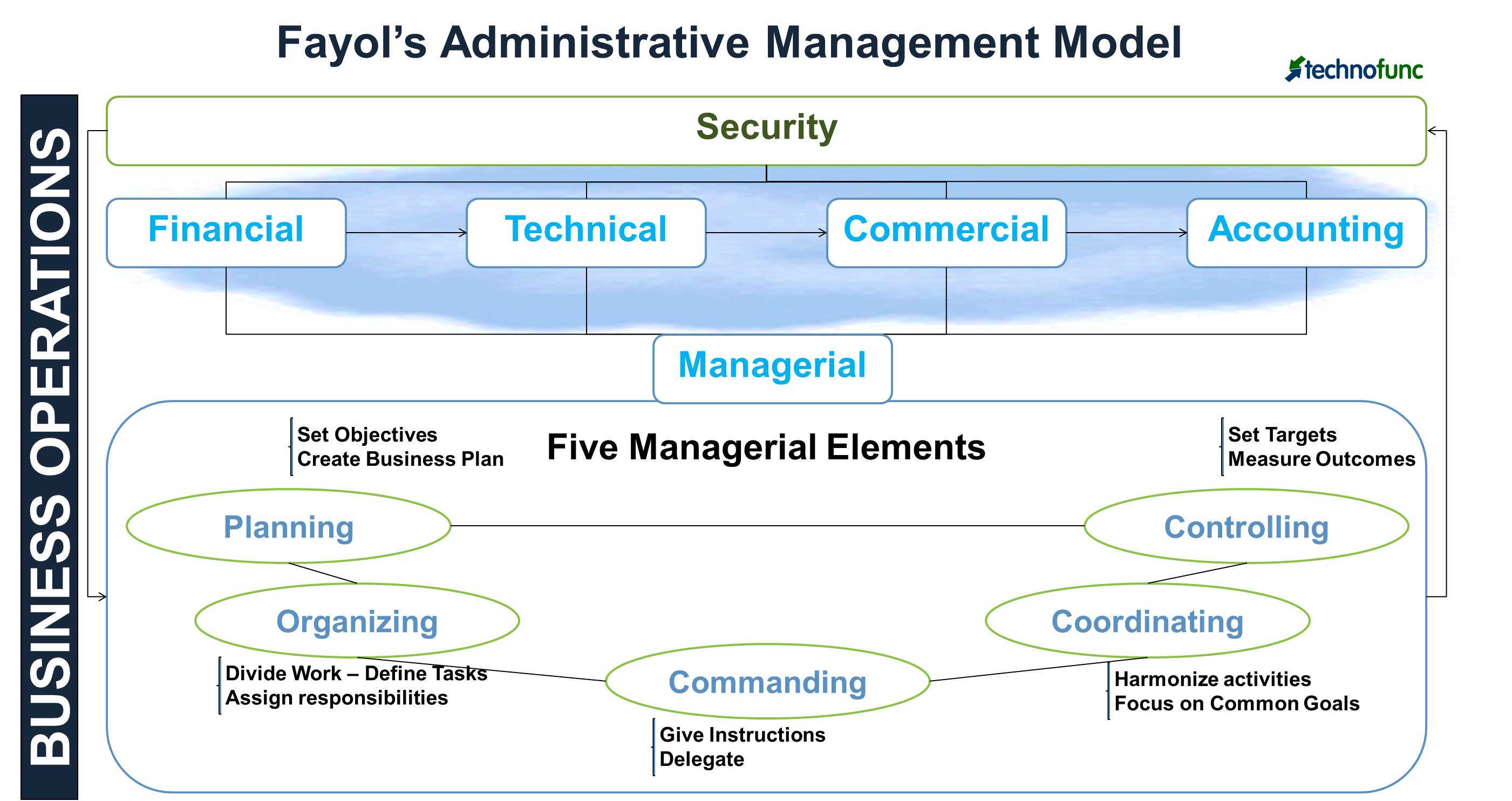- Home
- Business Processes
- Industry Knowledge
- Aerospace Industry
- Automotive Industry
- Banking Domain
- BFSI Industry
- Consumer/ FMCG Industry
- Chemicals Industry
- Engineering & Construction
- Energy Industry
- Education Domain
- Finance Domain
- Hospitality Domain
- Healthcare Industry
- Insurance Domain
- Retail Industry
- Travel and Tourism Domain
- Telecom Industry
- Leadership Skills
- eLearning
- Home
- Leadership Skills
- Leadership & Management
- Administrative Theory by Fayol
Administrative Theory by Fayol
The administrative theory of management is focused on principles that could be used by managers to coordinate the internal activities of organizations. The most prominent of the administrative theorists was Henri Fayol. Fayol observed a work stoppage and judged it to be a management failure. He believed that organizational managerial practices are important for driving predictability and efficiency in organizations.
Fayol’s Administrative Management Theory
The administrative theory of management is focused on principles that could be used by managers to coordinate the internal activities of organizations. The most prominent of the administrative theorists was Henri Fayol. Fayol observed a work stoppage and judged it to be a management failure. He believed that organizational managerial practices are important for driving predictability and efficiency in organizations.
While the proponents of scientific management developed principles that could help the individual workers perform their tasks more efficiently, the administrative theory focused on principles that could be used by managers to coordinate the internal activities of organizations. The most prominent of the administrative theorists was Henri Fayol.
Henri Fayol (1849-1925), was a French industrialist and a prominent European management theorist. Henri Fayol is known as the Father of Management and he developed a general theory of management and also, laid down the 14 principles of Management. Fayol was unknown to American managers and scholars until his most important work, "General and industrial management", was translated into English in 1949. These 14 principles of management are used to manage an organization and are beneficial for prediction, planning, decision-making, organization and process management, control, and coordination.

Administrative Management
Many of the managerial concepts that make the foundation of modern management thought were first articulated by Fayol. Fayol believed that with scientific forecasting and proper methods of management, satisfactory predictable results were sure to follow. The theory falls under the Administrative Management school of thought (as opposed to the Scientific Management School led by Fredrick Taylor).
According to Fayol, the business operations of an organization could be divided into six broad activities.
- Technical: Producing and manufacturing products
- Commercial: Buying, selling and exchange
- Financial: Search for optimal use of capital
- Security: Protecting employees and property
- Accounting: Recording and taking stock of costs, profits, liabilities, maintaining balance sheets and compiling statistics
- Managerial: Planning, organizing, commanding, coordinating and controlling
Fayol’s Five Elements of Management
Fayol studies primarily focused on the last activity which is “Managerial Activity”. He identified five major elements of management that depict the expected behaviors that managers should engage in to achieve the business objectives of the organization effectively. The five elements of management are:
- Planning
- Organizing
- Commanding
- Coordinating
- Controlling

Let us briefly discuss these five elements of management as described by Fayol and relevant for modern enterprises and managers even today.
1. Planning:
Planning is the most important managerial function. It is a future-oriented exercise to creating a business plan, determining the different stages to execute and track the plan and define the technology and resources necessary to implement the plan. Planning is all about identifying in advance what needs to be done, how it will be done, and what are the timelines and responsibilities for execution. It lays down the roadmap of the current organizational state to where the organization wants to be. The outcome of the planning function is logical goals and their timelines. Managers should engage in both short-range and long-range planning.
2. Organizing:
Once a plan of action is designed, managers have the visibility of what is expected and by when. To achieve these milestones, they need to solve for resources and assign them appropriate tasks. They need to focus on providing everything necessary to carry out the plan; including raw materials, machinery and tools, capital, funds, and human resources. They must identify and establish responsibilities for each of the departments or divisions, and specifying organizational relationships.
3. Command:
Managers need to implement the plan by efficiently utilizing the allocated resources. They must understand the strengths/weaknesses of their workforce and the limitations of the resources at hand. Managers must lead and motivate employees to achieve the goals of the organization. Employees may require the proper allocation of resources and an effective support system and supervision. Directing requires exceptional interpersonal skills and the ability to motivate and inspire people while balancing the staff and production needs.
4. Coordination:
Organizations are interdependent systems and need coordination among different departments to stay in sync and targeted on the plan. Manager’s biggest responsibility is to "harmonize" all required activities across different functions to facilitate and ensure organizational success as per the agreed plan. Managers need good Communication Skills to ensure that the coordinating mechanism is working effectively. Managers are needed to synchronize the elements of the organization and must take into account the delegation of authority and responsibility and span of control within units.
5. Control:
The final element of management as described by Fayol involves the comparison of the activities of the personnel to the plan of action. It is the control and evaluation component of management. Control function ensures that tasks have been completed with required quality in all areas and helps to detect deviations if any from the organization's plan. This ensures quality performance with regard to business objectives and satisfactory results while maintaining an orderly and problem-free environment. Controlling includes information management, measurement of performance, and the institution of corrective actions.
Relevance in the modern workplace
Fayol believed that managerial practices were the key component to predictability and efficiency in organizations. Fayol’s five management functions are clearly similar to modern management functions - planning, organizing, staffing, and controlling. Fayol's concept of management forms the cornerstone of contemporary management theory. Many of Fayol's practices are still alive in today's workplace. These elements can be found in modern organizations in several ways: as for accepted practices in some industries, as revamped versions of the original principles or elements, or as remnants of the organization's history to which alternative practices and philosophies are being offered. The new manager in the digital age must acquire the latest leadership skills and management skills to succeed in today’s competitive world.
Suggested Reading and Resources
Related Links
Creation Date Sunday, 23 August 2020
Hits 110391
You May Also Like
-
Contingency Theories of Leadership
Contingency theories of leadership focus on both the leader's persona as well as the situation/environment in which that leader operates. These theories consider the context of leadership which means whether or not the leadership style suits a particular situation and states that a leader can be effective in one circumstance and a failure in another one. A leader will be most effective when he applies the right leadership style to a given situation and environment around him. Contingent leaders are flexible and adaptable.
-
All the teams are dynamic in nature and they take time to come together, they form, develop, and grow in stages, over a period of time. Teams go through five progressive stages: Forming, Storming, Norming, Performing and Adjourning. In this article, we want to introduce you to these stages of team development and certain strategies that you can use to help the team grow and develop in each of these stages.
-
Maslow's hierarchy of needs is a motivational theory that explains that people are motivated by five basic categories of human needs. These needs are physiological, safety, love and belonging, esteem, and self-actualization. There is a little scientific basis for this concept of a hierarchy of needs.
-
The Systemic Approach to Leadership
The systemic approach to leadership looks at the organization as a whole and focuses on the understanding of the organization as a system. Moving to systems thinking demand managers to view organizations as organic systems. Leaders are also part of this complex system which is constantly undergoing change and evolving. The leaders need to manage the relations and networks within these systems by acting with systemic awareness.
-
Bass's Transformational Leadership Theory
Bass Transformational Leadership Theory is based on performance beyond expectations approach which defines four elements of transformational leadership. The 4 elements described by Bernard A. Bass in 1985 are Idealised Influence, Intellectual Stimulation, Individualised Consideration, and Inspirational Motivation. This study highlights four key insights about performance beyond expectations and associated criteria to measure it.
-
Burns Transformational Leadership Theory
Transformational leadership theory has been defined by James MacGregor Burns as a process where both leaders and followers mutually raise one another to higher levels of morality and motivation. The concept of transforming leader works with teams to garner trust, respect, and admiration while reaching to higher moral positions. The transformational theory of leadership was developed while studying political leaders and how they use charismatic methods to attract people to the values.
-
Jung first introduced his personality theory and explained that all humans have a natural impulse to relate meaningfully to the world through productive work and people through significant relationships. He used four psychological functions - thinking and feeling (rational functions) and sensation and intuition (irrational functions). He also used introversion and extraversion and its impact on appropriate leader behaviors.
-
Leadership has been defined in different ways by different sets of scholars. In very simple terms leadership can be defined as the skill of a person to influence an individual or a group for achievement of a goal in a given situation. One can use different dimensions and perspectives to define leadership. Through the evolution of leadership thought, leadership has been defined in various ways discussed here.
-
Leadership Traits – A great List
What are the qualities and characteristics of a good leader? Great leaders possess core leadership traits and skills. The list includes the most important leadership qualities and skills to look for in a great leader. These are must-have traits of a powerful and successful leader, the qualities a leader possess to be great.
-
Behavioral Theories of Leadership
Behavioral Theory of leadership is a big leap from Trait Theory, as it was developed scientifically by conducting behaviour focused studies. The theory emphasizes that leadership capability can be learned, rather than being inherent. This theory is based on the principle that a leader's behaviors can be conditioned in a manner that one can have a specific response to specific stimuli.
Explore Our Free Training Articles or
Sign Up to Start With Our eLearning Courses

About Us
Learning
© 2023 TechnoFunc, All Rights Reserved











"Everyone needs some concepts of management; in the home, in affairs of state, the need for managerial ability is in keeping with the importance of the undertaking, and for individual people, the need is everywhere in greater accordance with the position occupied".